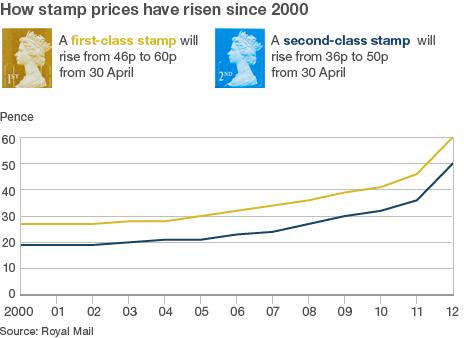Stamps rationed by Royal Mail in run up to price rise
- Published
Shopper stockpiling in Birmingham: "I bought 200 first class and 100 second class"
Royal Mail is rationing retailers' purchase of stamps to make sure it benefits fully from the price rise due on 30 April.
Royal Mail said the "prudent and appropriate" policy was designed to "protect revenue".
Superdrug has been told by Royal Mail that it had reached its full quota.
Some retailers are running low as customers buy stamps in bulk before the price rise. A first class stamp will rise in price from 46 pence to 60p.
A second-class stamp will go up from 36p to 50p.
One optician told the BBC News website that he was planning to buy 10,000 stamps in advance of the price rise, to prevent a "significant" increase in costs.
'Shameless profiteering'
The Royal Mail has capped supplies this month to 20% of a retailer's annual allocation, hoping that retailers do not gather extra profit by bulk-buying supplies ahead of the price rise to sell later.
"We are more than happy for retailers to receive the normal commercial return they obtain on stamps and no more than that," a Royal Mail spokesman said.
"That is why we have put in place a prudent allocation policy to safeguard Royal Mail's revenues and ensure there are more than enough stamps for people to buy both now and in the future."
The service said the additional money generated from the price rise was needed to keep the six-day postal service that "has been loss making for some time".
It said demand for stamps had increased immediately after the announcement of the price rises at the end of last month, but had since dropped back.
"There is a good supply of stamps across the country. We have more than adequate stock in place to meet customer demand," it said.
The announcement of the price rises came after the regulator Ofcom lifted some price controls on Royal Mail.
It claimed the future of the universal service was at "severe risk" without relaxing controls.
Limit
Many small businesses still rely on Royal Mail for deliveries, but use of postal services has dropped among consumers.
Officials from Ofcom recently told the Commons Business Committee that the average UK family now spent less than 50p a week on mail services.
Yet, George Thomson, general secretary of National Federation of Sub-Postmasters, told the BBC that the rush to buy stamps at post office branches was "almost like Christmas".
Robert Hammond, Consumer Focus: ''It is a good idea for people to go out and buy stamps now'
He said that they were working to ensure there was no rationing of stamps at post offices and "only one or two" of the 11,500 branches had run out. The majority were selling as many as the public needed, he said.
However, Superdrug said it had been contacted by Royal on Tuesday to say that the retailer had reached its limit and would not be supplied with any more until the end of the month, when the price rises come in.
The retailer said it had always had a limit of 72 stamps per person when it offered discounts, to ensure a fair deal for all customers. This limit remained, although the latest 5% discount offer ended on Tuesday.
'Badly affected'
Richard Spruce is an optician who works in a practice with branches in Alloa, Alva and Selkirk.
The business sends out 5,000 reminders to patients each year, so Mr Spruce is planning to buy 10,000 stamps in advance of the price rise - saving £1,400.
"For us it is quite a significant price rise. It is a good idea to stockpile. We were going to buy these stamps anyway," he said.
"Most of our patients would like reminders through the post. But we have to look to e-mail or text message reminders."
John Walker runs a property management company and orders about 200-300 first-class stamps a month from a business that supplies stamps to small businesses.
"I received a fax saying that stocks had run out and that Royal Mail had suspended replacement supplies until the end of the month," he said.
"I have always supported Royal Mail and understand the need for the price rise. However this action will badly affect my business."
He said he had enough supplies for a week, but was now expecting to spending time queuing at the local post office branch to buy more.
Ian Murray, the shadow postal affairs minister, criticised Royal Mail's actions.
"Royal Mail have an obligation to meet the demand from the general public," he said.
He claimed that the price rises were part of the process to "fatten up Royal Mail ready for privatisation", and added that he would be writing to regulator Ofcom.
Robert Hammond, director of postal policy at watchdog Consumer Focus, said: "With unprecedented price rises on the way, it is understandable that consumers who rely on the postal service will be buying stamps before the increase.
"We would expect Royal Mail to take steps to meet increased demand in the run up to the price change."
The 30% price rise in first-class stamps, and 39% rise for second-class, mark the biggest annual increase in percentage terms since 1975. Ten years ago, a first-class stamp cost 27p, and a second-class cost 19p.
The regulator has capped the price of second-class stamps at 55p. However, this cap can rise at the rate of inflation over the next seven years.

- Published27 March 2012
- Published30 April 2012
- Published2 March 2012
- Published28 February 2012
- Published21 February 2012